Martin Edwards's Blog, page 63
February 4, 2022
Forgotten Book - Death in the Hopfields
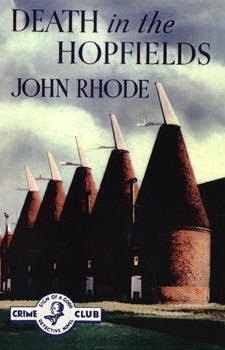
It is often said - not least by me - that one of the reasons why Golden Age detective fiction is enjoying considerable popularity to this day is that the books present a picture of a vanished world. We can learn a great deal about society, in particular English society, from crime novels written between the two world wars. If the past is a foreign country, Golden Age novels are often pretty good tour guides.
A picture of a long-gone society emerges clearly and in considerable detail in John Rhode's 1937 novel Death in the Hopfields. Set in Kent, 'the garden of England', this story explores the way that hop-pickers, often from the East End of London would descend upon rural communities to help pick the hops. As ever, coping with this kind of influx of seasonal workers had pros and cons, and Rhode explores these at considerable length. I found this background extremely interesting. Today, things are done very differently. From the 1960s, mechanisation changed the way the work was carried out.
It is as well that the background is rich in interest, because the detective story itself is less than gripping. Nick Fuller has reviewed the book on his admirable blog The Grandest Game in the World and has included a number of contemporary reviews. Even in 1937, it's clear that a number of critics were unimpressed by the detective elements and the glacial pace with which developments unfold. The suggestion by Torquemada that the background includes a lot of padding is not, I'm afraid, unfair. No wonder the Spectator found it 'heavy going'.
So what is the mystery about? Well, the starting point is a jewel theft and a case of arson follows. There appears to be an obvious suspect, but Dr Priestley gets involved, and needless to say, he is the one to put his finger on the truth, although by that stage I'd lost interest. Rhode clearly had a good idea for the disposal of a body, but what might have made a great short story is a very stodgy novel. I should say that the Puzzle Doctor liked this novel much more than I did. Overall, though, this is a book which vividly illustrates the problem of novelists who produce too many books too quickly. It's inevitable that quality will suffer.
February 3, 2022
No Time to Die - 2021 film review

No Time to Die is the latest James Bond film, long-awaited and much-delayed as a result of the pandemic. Was the wait worthwhile? Were expectations met? For me, the answer is yes. You know what you are going to get with a James Bond movie and the key question is: how well does it deliver the goods? This is Daniel Craig's final appearance as Bond and as always he does a good job. I was a fan of Sean Connery, but on the whole I think that the Cheshireman is my favourite 007.
It's a long film, and making an action thriller that sustains interest for almost two and three-quarter hours is a major challenge. However, No Time to Die rises to that challenge, which is probably just as well given that apparently the total budget for the film was in the region of $350 million. Some of the action takes place in Matera and I visited the town on holiday just after most of the filming there was done. A brilliant location, for sure, and that is true of several other stunningly atmospheric backgrounds, including the frozen lake in Norway which features early on in the story.
The premise is that Bond has actually retired from being a secret agent. There's a new 007. Five years have passed since an attempt to kill him in Matera failed, and he left Madeleine Swann because he thought she'd betrayed him. He is persuaded to resume active service following the kidnap of a scientist who has developed a bioweapon (the script was written pre-pandemic, but perhaps this aspect of the story makes a greater impression now than it might otherwise have done).
There are some pleasing performances from Lea Seydoux (Madeleine) and those terrific actors Ralph Fiennes and Rory Kinnear, but naturally Craig is dominant. He will be a tough act for someone to follow. And I liked the fact that the film included one of my favourite songs of all time, the Bond classic 'We Have All the Time in the World', written by two greats, John Barry and Hal David. When it featured originally in On Her Majesty's Secret Service, the song didn't receive the acclaim it deserved. But it stands the test of time, and so - perhaps unexpectedly - does James Bond.
January 31, 2022
The Disappearance of Harry - 1982 TV movie
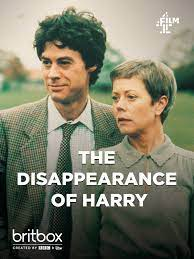
I've recently enjoyed watching One Foot in the Grave all over again, admiring not only David Renwick's brilliant writing but also some excellent acting. Annette Crosbie, for instance, is great as Margaret Meldrew and when I came across a film from earlier in her career, The Disappearance of Harry, I was intrigued and decided to give it a go.
This is an obscure film, and although it has a number of very appealing ingredients, I have to say that its failure to make a lasting impression is no real surprise. The writers, Howard Wakeling and Joseph Despins (Despins also directed) seem to have had rather brief careers and although there are genuine signs of talent in the build-up of the story, its anti-climactic finale reveals that they didn't think the story through (a striking contrast to the way David Renwick writes, by the way). Or perhaps they did have a concept in mind, but it was simply too flimsy to work.
There are some decent actors in the cast, including David Calder, Philip Locke, and Dudley Sutton, but Annette Crosbie carries the film. She plays Lizzy, a wife and mother who works on the shop floor in a Nottingham factory. Her husband Harry has his birthday at the start of the film, but is clearly distracted. Soon he leaves home, taking his personal belongings with him, together with all the photos of him in the family album. Lizzy is distraught and completely baffled.
As she tries to find out what has happened to Harry, she finds herself on the edge of various politically-driven conspiracies: one involves a bunch of trade unionists resistant to new technology, another involves a far-right political party. There's a mysterious message in a newspaper, a puzzle about an old watch bearing a date that never existed, fascinating scenes set in Nottingham's caves (which I must visit one day) and a bomb explosion. Oh, and Lizzy has a fling with a sexy young journalist (Cornelius Garrett). The dialogue refers explicitly to the fairy-tale feel of the storyline, but overall the story gives the impression of being a collection of ideas, rather than anything coherent.
I must say that I found this film perfectly watchable and it's certainly never dull, despite a consciously mundane ambience. But in the end I also found it frustrating. I imagine that most viewers, like me, would like to know exactly what happened to Harry. Spoiler alert: solving that puzzle is not what the film is about.
January 28, 2022
Forgotten Book - Cat and Mouse
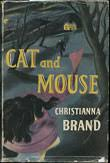
I first read Christianna Brand's Cat and Mouse a very long time ago - probably in the early 80s. I knew Julian Symons had extolled the book in Bloody Murder as her best (I believe he was also a fan of a later novel, The Rose in Darkness) but I confess I was underwhelmed. Having forgotten pretty much everything about the story except for the fact that it's set in Wales, I've had another go. And, as sometimes happens, my judgment this time was considerably more favourable.
I've always been a fan of Brand, but at the same time I've had reservations about some aspects of her characterisation. She does set out, clearly, to create people who are much more than mere ciphers, and that is admirable. The snag, at least for me, is that her characters are often highly-strung and overwrought. Given the nightmare of being involved in a murder case, that's fair enough up to a point, but at times I think Brand overdoes the hysterics so that the angst becomes a bit irritating. That said, I suspect this is a minority opinion, at least among Golden Age fans.
Cat and Mouse is unusual in her repertoire in that it sets out very deliberately to conjure up melodrama. There is an entertaining dedication to 'Mary Lewis' (this was Brand's married name!) which references Northanger Abbey, and this sets the context for the story. What we have here is an overt homage to Austen's splendid novel (I read it as a schoolboy and loved it; time for a re-read) in terms of the melodrama.
The catalyst for the mystery (which Brand took from a real life incident) is a set of letters received by a journalist on a magazine by a woman who calls herself Amista. It seems that Amista has married a glamorous chap called Carlyon and the journalist, while in Wales, attempts to look up the happy couple. But there is no sign of Amista and it is soon clear that Something Is Up. What follows is a twisty puzzle that is rather unorthodox and, despite those overwrought bits, intriguing and enjoyable.
January 26, 2022
Bibliomysteries
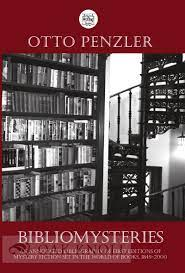
The term 'bibliomystery' appeals to me. It's a term that has been popularized by Otto Penzler, the founder of the Mysterious Press and owner of the wonderful Mysterious Bookshop in New York City. I'm not sure if Otto coined the term itself, but no question, he's done more than anyone to promote the reading and writing of bibliomysteries. Not content with editing an impressive number of high quality anthologies, Otto has produced book-related books of his own such as the fascinating Mysterious Obsessions (which I'll talk about in a future blog post) and also a slim volume called....Bibliomysteries.
This book is described as 'an annotated bibliography of first editions of mystery fiction set in the world of books, 1849-2000'. It is also a gorgeous book, because it includes lots of full-colour illustrations of rare dust jackets, ranging from The Library of Death by Ronald S.L. Harding (never heard of it before, but a fab title and a fab jacket) to the equally obscure Inspector Wilkins Reads the Proofs, by Murray Thomas, definitely the sort of title you never encounter in modern fiction.
So what exactly is a bibliomystery? Otto acknowledges in his intro that it's a vague term - the same can be said for 'crime fiction' itself - but in essence, these are mysteries set in the world of books. So Nicholas Blake's End of Chapter, with a publishing background, is a natural for inclusion in this volume, but so is Blake's The Private Wound, which has a protagonist who is a novelist. I don't know if my own Lake District Mysteries, which feature Marc Amos the bookseller as a recurring member of the supporting cast of characters, count as 'bibliomysteries'; some don't, but I guess The Serpent Pool would.
I've been responsible for an anthology of bibliomysteries of my own, Murder by the Book, which was fun to compile, but there's no doubt that in this field Otto sets the gold standard. By commissioning new bibliomysteries regularly, he is keeping a lovely tradition very much alive. Check out this listing which includes some wonderful authors, many of them real favourites of mine. And yes, I'm very pleased to be among them; writing The Traitor for this list was truly pleasurable, and I'd like to write more about my 'book detective' Benny Morgan one of these days. As for Bibliomysteries, it would make a handsome gift for any bibliophile.
January 24, 2022
Dangerous Lies - 2020 film review

Dangerous Lies is a recent Netflix movie which was originally entitled Windfall. I was attracted, in part, by the presence in the cast of Elliot Gould, an actor I've often enjoyed watching. It's a twisty thriller, although it has to be said that some of the twists are rather random and unsatisfactory. Because it's a well-made film, I kept watching to the end, although there were plenty of plot elements that I found frustrating.
The film begins well. Kate (Camila Mendes) and Adam (Jessie T. Usher) are a young married couple who are short of cash. She's working as a waitress in a diner while he pursues his studies. One night Adam calls at the diner and while talking to Kate, a robbery takes place. Adam comes to the rescue, attacking the robber. He's a have-a-go hero, so I found it odd, and almost inexplicable, that four months later, he and Kate are so desperate for money that he's abandoned his studies. Later revelations in the convoluted script paint in more detail about the robbery, but I didn't find them convincing.
Kate has now taken a job as a carer for an eccentric but wealthy loner played by Elliot Gould. The two of them form a close bond and he gives her a cheque for $7000 when he learns of her financial struggles. Adam persuades her to overcome her reluctance to bank it (their moral compasses fluctuate quite a lot, it has to be said), but shortly after that the old man dies. It seems to be a natural death and Kate tells the authorities that he wished to be cremated.
The complications begin to pile on as the couple find a large stash of cash in the house. A mysterious lawyer turns up, claiming to have drafted the old man's will, which leaves everything to Kate. (The legal aspects of the story struck me as deeply unconvincing). It all becomes hopelessly unlikely, most of all the last few scenes. Yet despite this, my interest was engaged throughout, a tribute the actors rather than the script. I think this one is best regarded as adequate light entertainment.
January 21, 2022
Forgotten Book - One is One
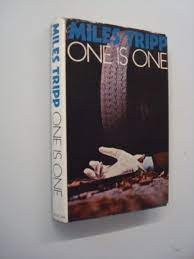
Miles Tripp is an author who has intrigued me for a long time. His writing was admired by Len Deighton and Julian Symons (who mentioned him in Bloody Murder) and you can't get much better judges than those two, yet he faded into obscurity even while he was still writing, and I've not found many people who have read his books. Reading his 1968 stand-alone One is One reminded me of the quality of his writing, but it's a book which also supplies some clues as to why he never really made it big as a crime writer, despite publishing no fewer than 37 novels, including a series featuring the private eye John Samson.
The early pages of One is One chart a marriage that is seemingly on the rocks. Mark Donaldson is a businessman married to the gorgeous Marie, but her extravagance is driving him into debt. He conceives a wild plan, connected to Marie's potential inheritance, which involves killing an old man in France. At first it seems that he has got away with murder, but there is a witness to his crime...
I found this book extremely readable,while Tripp's insights into character are sometimes compelling. What is more, the story is unusual. It begins as a relatively straightforward variation on the 'inverted mystery' theme and develops into something much more elaborate. There are several surprise twists, some of them involving impersonation.
I haven't been able to find any discussion about this book, or any significant reviews, and I imagine Tripp must have been disappointed that the novel seems to have made little impression. But there are reasons for this. In a nutshell, Tripp was too unorthodox for his own good. We start by following Mark's activities, but the viewpoint keeps shifting and there are a number of flashbacks. I'm not convinced that Tripp found the best way of structuring a rather interesting plot. His chosen method doesn't quite achieve the necessary suspense, and feels a bit disjointed. This is a pity, because he has some interesting things to say about relationships, in particular those involving mutual dependence. All too often, I've found myself frustrated by the way he handled his material. But he could write very well indeed, and his novels, despite their flaws, have an admirable ambition.
January 19, 2022
Waiting for You - 2017 film review
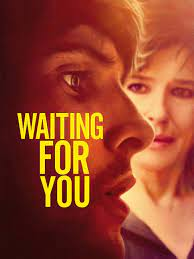
'Slow-burning' is an ambiguous, double-edged description. It can be shorthand for tedious. But it can also indicate a work of subtlety and sophistication. Waiting for You, directed by Charles Garrad, is a film which is definitely a slow burn, and although it's no masterpiece, it's well-made with a decent cast. As a rule, I'm not keen on films that lack pace, but I found this one eminently watchable, even though it's low-key from start to finish.
Colin Morgan plays Paul, a young man who works in Waterstone's. At the start of the film, his father dies, leaving him to wonder if secrets from the past - the old man was a soldier in Aden - help to explain why his mother (Clare Holman, best known as the forensic pathologist in Inspector Morse and Lewis) has been left penniless.
To his mother's dismay, Paul travels to France to follow an enigmatic lead and pretends to be an architectural student in order to gain access to a house in a remote part of southern France which is owned by the daughter of the man who was the commanding officer in Aden. She is played by Fanny Ardant, whose mysterious, almost menacing behaviour is intriguing. What is hidden in her father's old study, which she insists on keeping locked?
Gradually, those past secrets are revealed. In a sense, this is a mystery film, but it's also to some extent a coming-of-age drama, as Paul becomes involved with a young French woman as well as learning more about his father's past. The title comes from a Billy Stewart song, 'Sitting in the Park', recorded among others by Georgie Fame. When you watch this film, you do have to do a bit of waiting, but I thought it was worth my while.
January 17, 2022
The Woman in the Window - 2021 film review
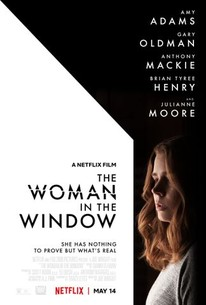
The Woman in the Window is a film based on A.J. Finn's bestselling novel, which I enjoyed reading when it was first published. It's a gripping book. Netflix must have believed it had blockbuster potential, but the movie has taken a pounding from the critics. The book itself borrowed the title of a famous film noir. It makes a virtue of its referential nature, and that seems to me to be obviously legitimate. True originality is very rare anyway. The question is: is this movie really as unsatisfactory as many good judges suggest?
The influence of Hitchcock is apparent throughout, even more than in Brian de Palma's thriller films. Amy Adams, who was so good as an addict in Sharp Objects, plays another deeply troubled woman, the agoraphobic Anna. It's a testing role and in my opinion she does a good job. She keeps an eye on her neighbours, in classic Rear Window fashion, and becomes intrigued by her new neighbours, the Russells.
In due course she encounters a problem of the Phantom Lady sort. Jane Russell, attractive blonde wife of a controlling husband and mother of a fifteen year old boy, comes round and they form a tentative friendship. But then Anna thinks she sees Jane being murdered. The cops are called but Mr Russell (Gary Oldman, whose part seems under-written) duly produces his attractive blonde wife, safe and well. The snag is that she is not the person Anna met.
I must confess that I love that kind of premise. Much depends on how it is resolved and my own feeling is that the storyline, tortuous as it is, makes a better fist of tying together the plot strands than is often the case. Yes, this is certainly no masterpiece. I do understand the critics' reservations, but judged on its own terms, the film seems to me to offer suspenseful entertainment.
January 14, 2022
Forgotten Book - The Man with the Cane
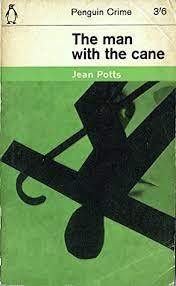
The late Robert Barnard was a discerning reader of crime fiction as well as an entertaining novelist, and he was a fan of the American writer Jean Potts; it's thanks to his influence that I've become a fan of hers too. I have a couple of Penguin paperback editions of her books that used to belong to him. One of them is The Man with the Cane, which dates from 1957, illustrates her considerable strengths as well as one or two of her limitations.
Potts was a low-key writer whose particular specialism was the study of domestic relationships. In this novel, the main protagonist is Val Bryant, a likeable ordinary guy. He is divorced from the high-achieving Doris, who has married a successful businessman called Monroe, and finds himself attracted to Barbara, who is herself recently divorced from Doris's brother Clyde. Val remains on good terms with Doris's mother Maudie and is also friendly with a neighbour, Helen, who is always known as Hen. Val and Doris had a young daughter, Annabelle, and when Val is reunited with the little girl after a long time apart, she tells him some tall stories, including one about a man she calls Cane.
These are the players in a tightly-knit drama. The plot thickens when Val and Hen discover the body of a man with a cane. He has been murdered and it soon becomes clear to Val that someone in his circle is responsible for the crime. I was pretty sure from early on who that someone would be, but the precise motive (one I found interesting) came as a surprise.
The strengths I mentioned include a sharp yet compassionate eye for character. Her insights into psychology are convincing, and in this book she makes subtle use of the hackneyed trope of poison pen letters. As for the limitations, I have a quibble about the regular shifts of viewpoint in this novel, which seem to me to reduce rather than to increase suspense. On the whole I think it's fair to say that Potts isn't the most exciting of writers. This is a good story, and not excessively long, but even so it does drag in the middle, with a good deal of time devoted to family squabbles that didn't set my pulse racing. Potts is sometimes compared to Margaret Millar and Helen McCloy, but I think they manage dramatic action more effectively than her. But if you're looking for a well-made, thoughtful mystery with a sound portrayal of human nature, you won't go far wrong with Jean Potts.



